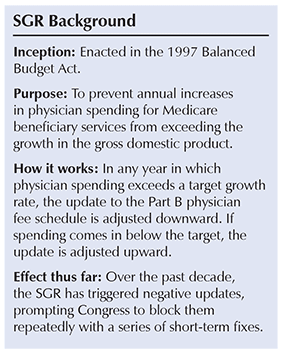In an overwhelming and rare bipartisan vote of 51-0, the House Energy and Commerce Committee July 31 approved legislation (H.R. 2810) that would repeal Medicare’s current physician payment system and create new payment incentives for physicians to deliver quality care.
Lawmakers have not said how they will pay for the bill, which would repeal the sustainable growth rate (SGR) formula in the payment system. Lawmakers will have to address that issue when they return from congressional recess in September.
The Energy and Commerce Health Subcommittee approved the measure July 23. The House Ways and Means Committee also is involved in crafting legislation.
The Senate Finance Committee, which has jurisdiction over Medicare in that chamber, has held several hearings on the issue but has yet to produce a plan. The committee July 31 held an informal meeting to discuss the issue, with senators saying the committee would produce its own plan this fall separate from that crafted in the House.
“Today’s vote is an important milestone, but we are all resolved to achieve reform in a fiscally responsible manner, and despite our significant progress, we will not be satisfied until the ink is dry on the president’s signature,” commerce committee Chairman Fred Upton (R-Mich.) said in a statement issued after the committee vote.
Details of Bill
The Energy and Commerce legislation would repeal the SGR and create a fee-for-service system in which providers would report quality measures. Providers also would have the ability to leave fee-for-service and opt for new ways of delivering care, such as medical homes.
During the phase-in period, physician groups—in coordination with the Department of Health and Human Services and medical standards-setting organizations—would work on quality measures that would be implemented in 2019, according to the proposal.
Physicians would receive a 0.5 percent annual increase for each of the first five years of the new payment system. Beginning in 2019, physician Medicare payments would include adjustments up or down, depending on how well their services met the new quality guidelines.
Physicians with the highest quality scores would receive a 1 percent payment increase over standard Medicare rates, physicians with quality scores in the midrange would receive no increase, and physicians in the lower range would receive a 1 percent payment reduction.
Providers also could opt to participate in demonstration programs featuring alternative payment models aimed at coordinating care and improving quality of care for patients.
Before voting on the final bill, lawmakers by voice vote approved an amendment by Reps. Michael C. Burgess (R-Texas) and Frank Pallone Jr. (D-N.J.) making several changes, including a restructuring of the alternative payment model section of the legislation.
Although the policy in the bill received bipartisan support, lawmakers have yet to identify ways to pay for the legislation, which could make the process of crafting a final bill more contentious.
The Congressional Budget Office has said freezing physicians’ Medicare reimbursement and preventing SGR-related cuts for 10 years would cost $139 billion.
That is about $100 billion less than previously estimated, and as a result, lawmakers and physician groups say this year provides a rare opportunity to permanently fix the system at a lower cost. Physicians’ Medicare reimbursement will be reduced about 25 percent in January 2014, unless Congress acts.
Senate Finance Committee Meeting
Shortly before the Energy and Commerce Committee vote, Senate Finance Committee members and staff held their first closed-door meeting to discuss replacing the SGR formula. As senators emerged from the hour-long session, both Republicans and Democrats said they were encouraged by the discussion.
Other senators emphasized that they had not discussed the details of any specific plan, which is being crafted by bipartisan committee staff members. “It was a listening session,” said Sen. John D. Rockefeller IV (D-W.Va.).
Members attending the session said they agreed only on the general goal of developing a new Medicare physician payment system by the end of the year. “We have a Dec. 1 deadline,” said Sen. Benjamin L. Cardin (D-Md.).
The Finance Committee is likely to draft its own legislation, rather than work from the House measure, Sen. Debbie Stabenow (D-Mich.) and Cardin said. Senators also said they did not discuss how any SGR replacement plan would be paid for.
“It’s an issue, but we’re looking to see if it’s the right policy,” Cardin said. “I think everyone agrees we should permanently fix [the] SGR.”
The Takeaway: Momentum is a building in Congress for a permanent fix to SGR formula used to set Medicare physician payment.
Associated Data

